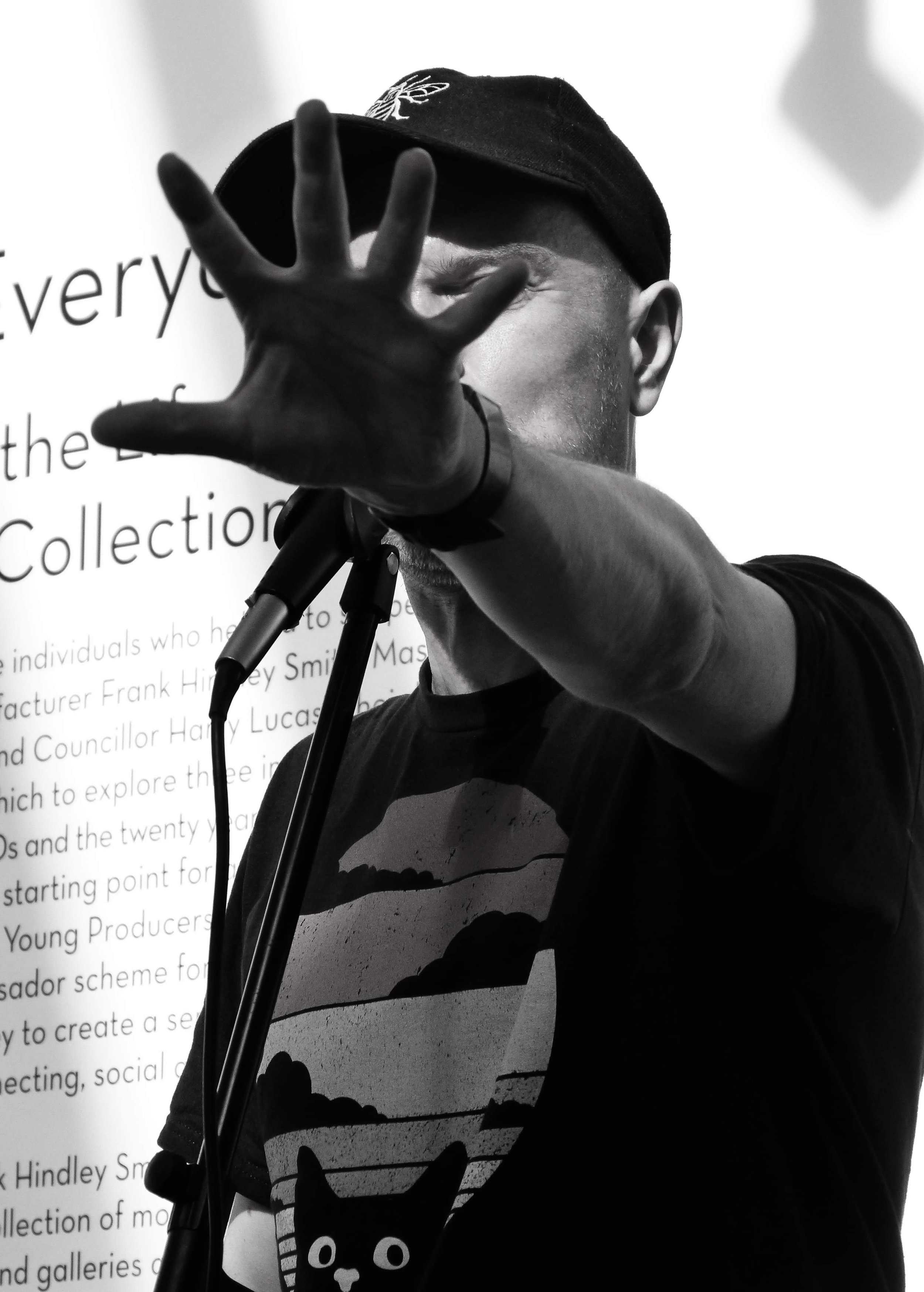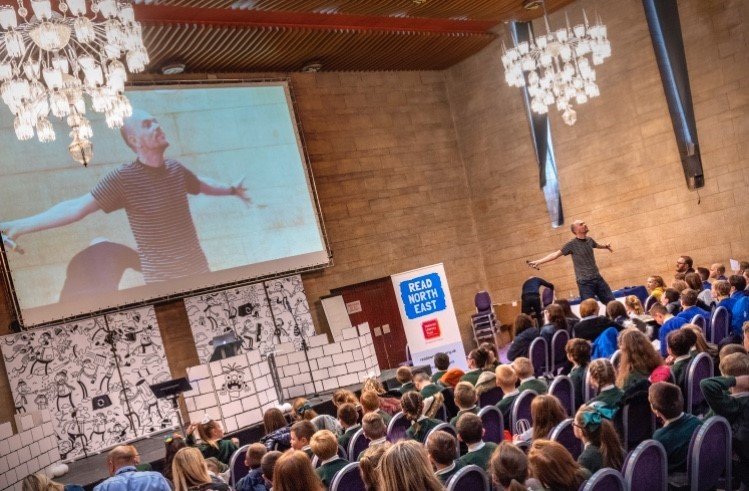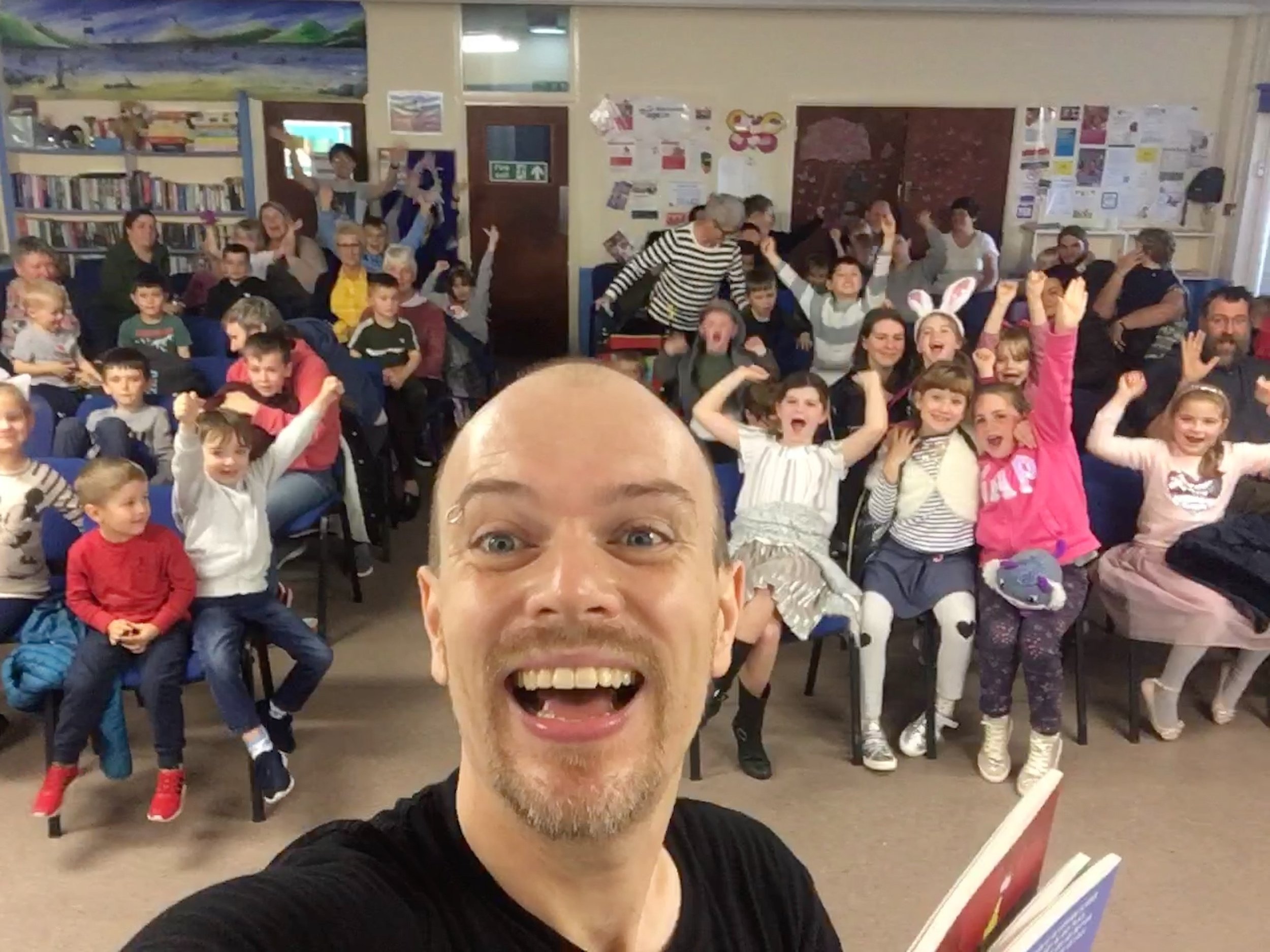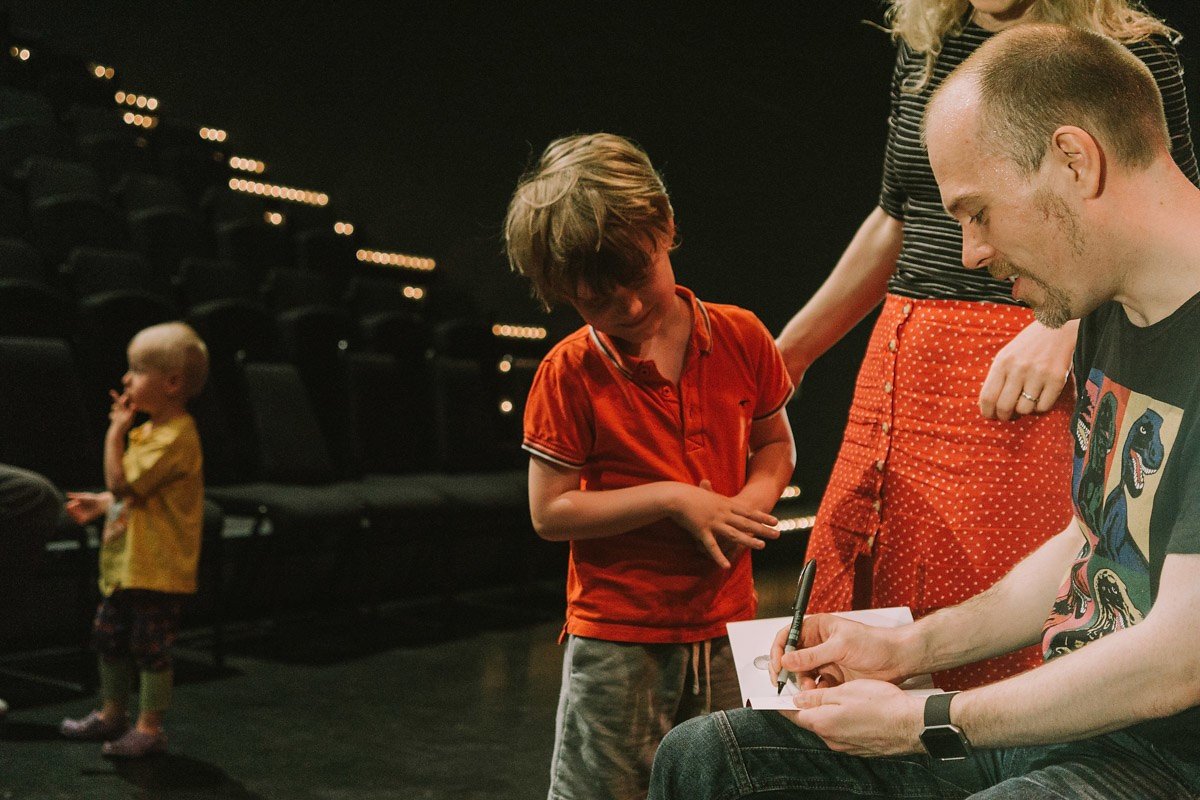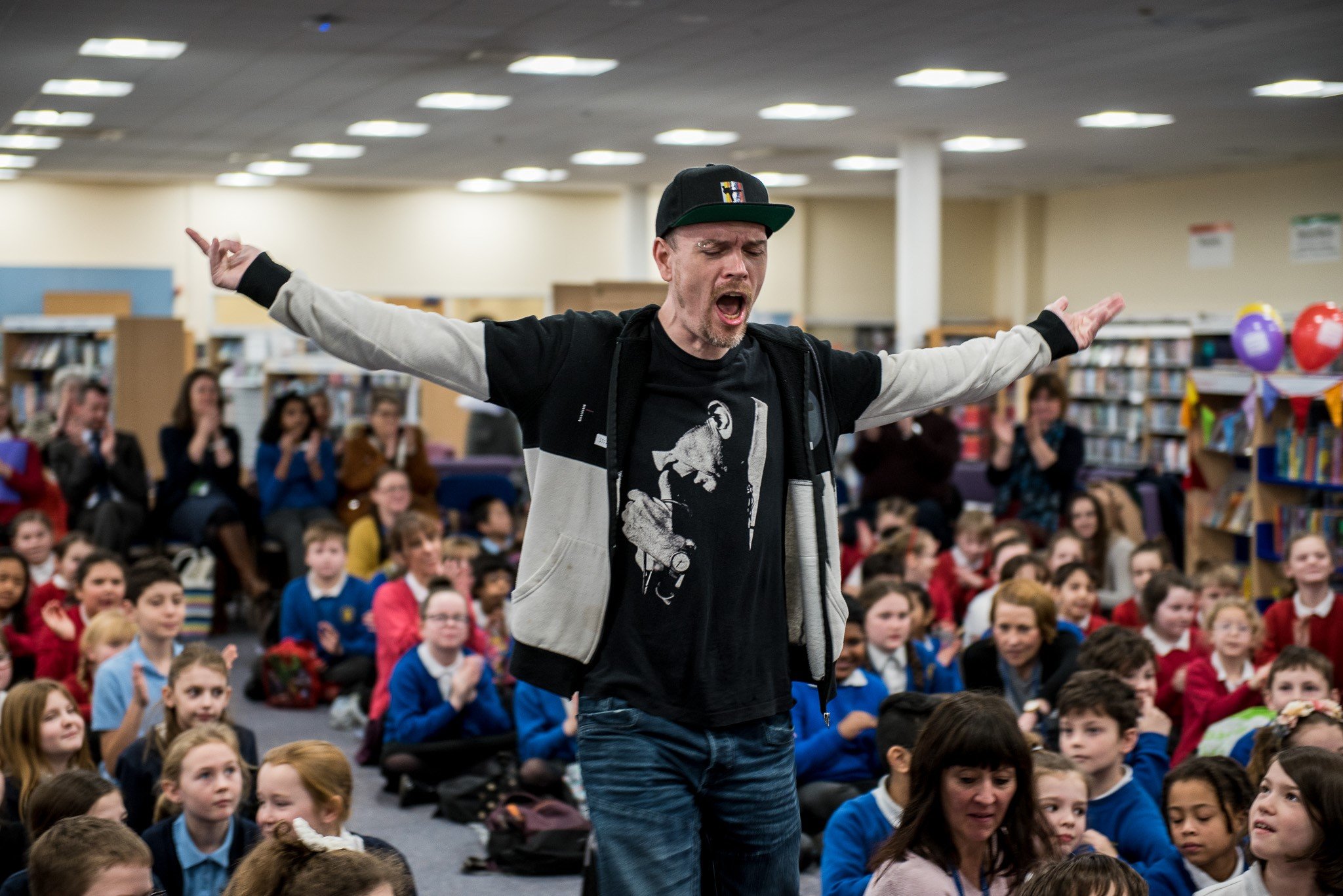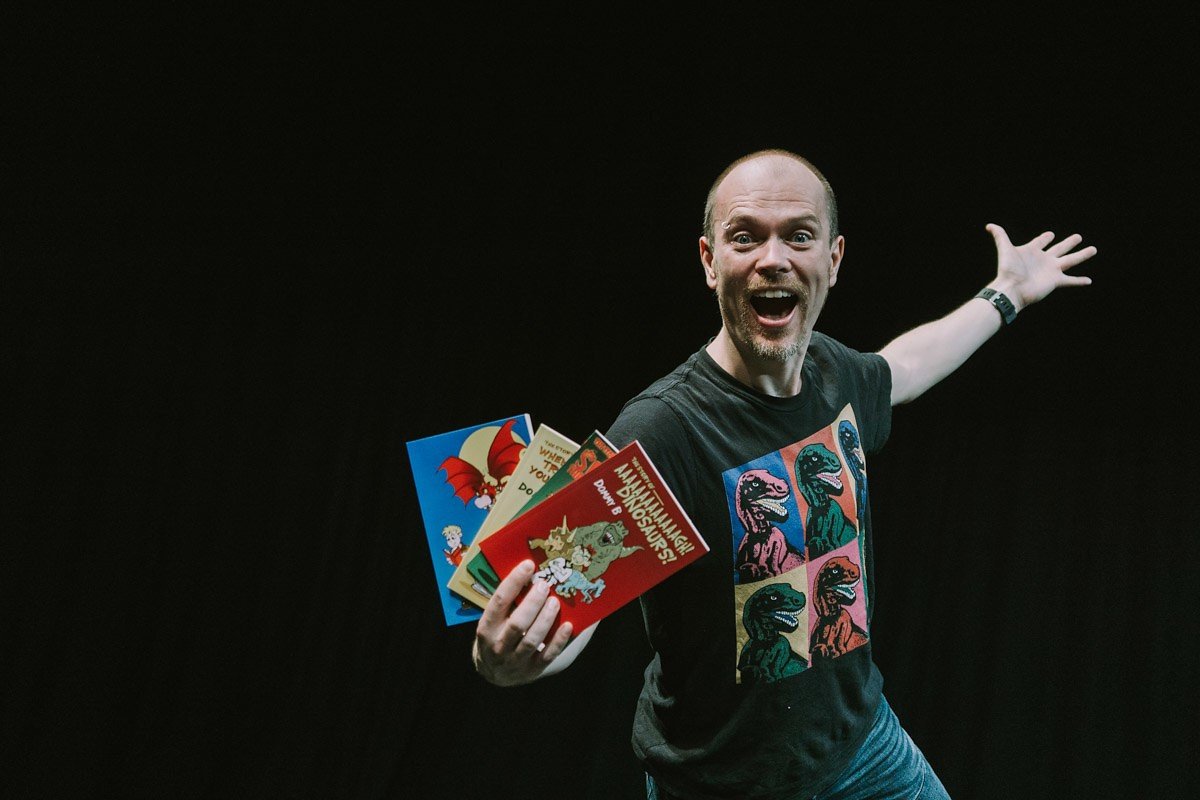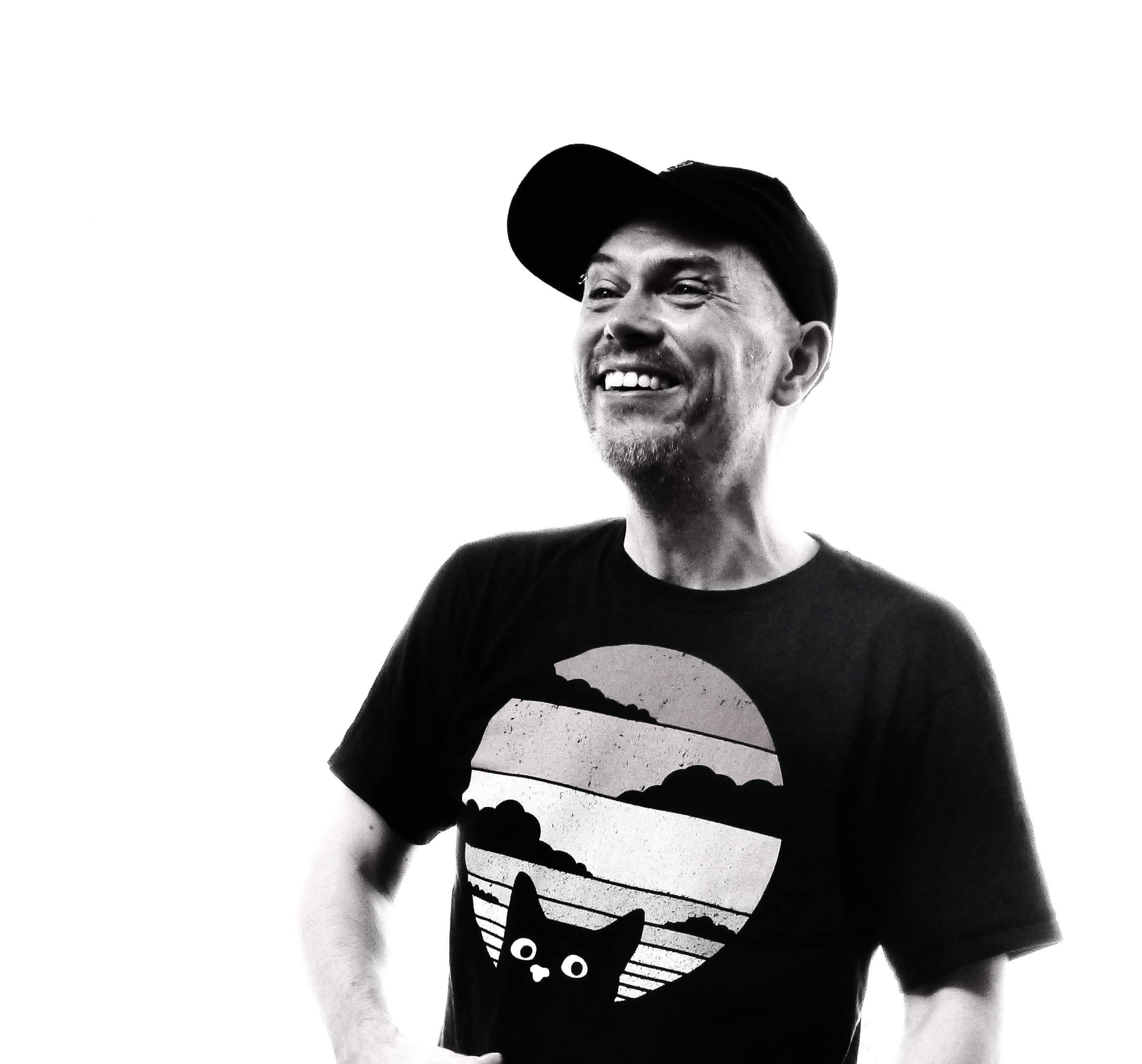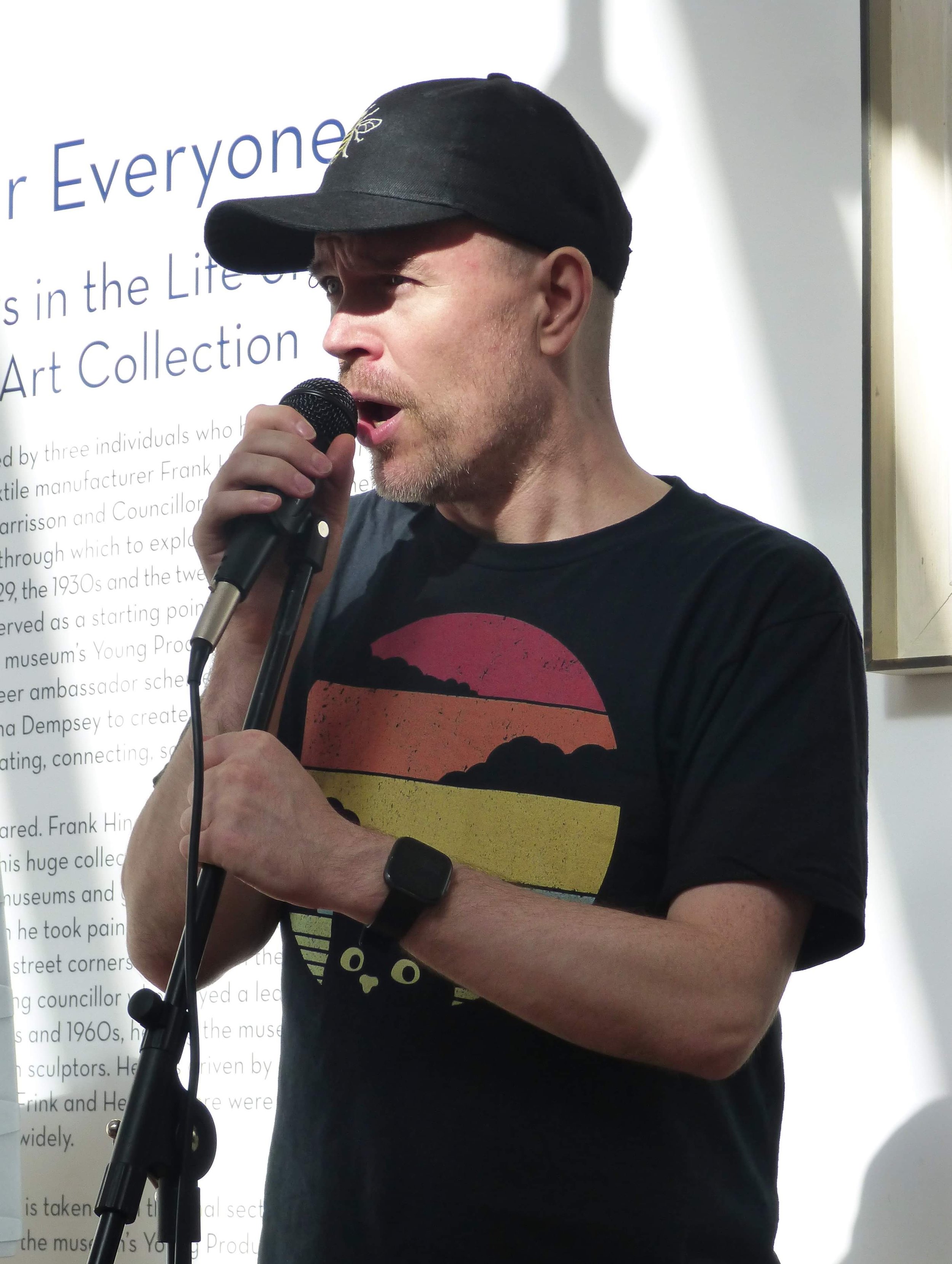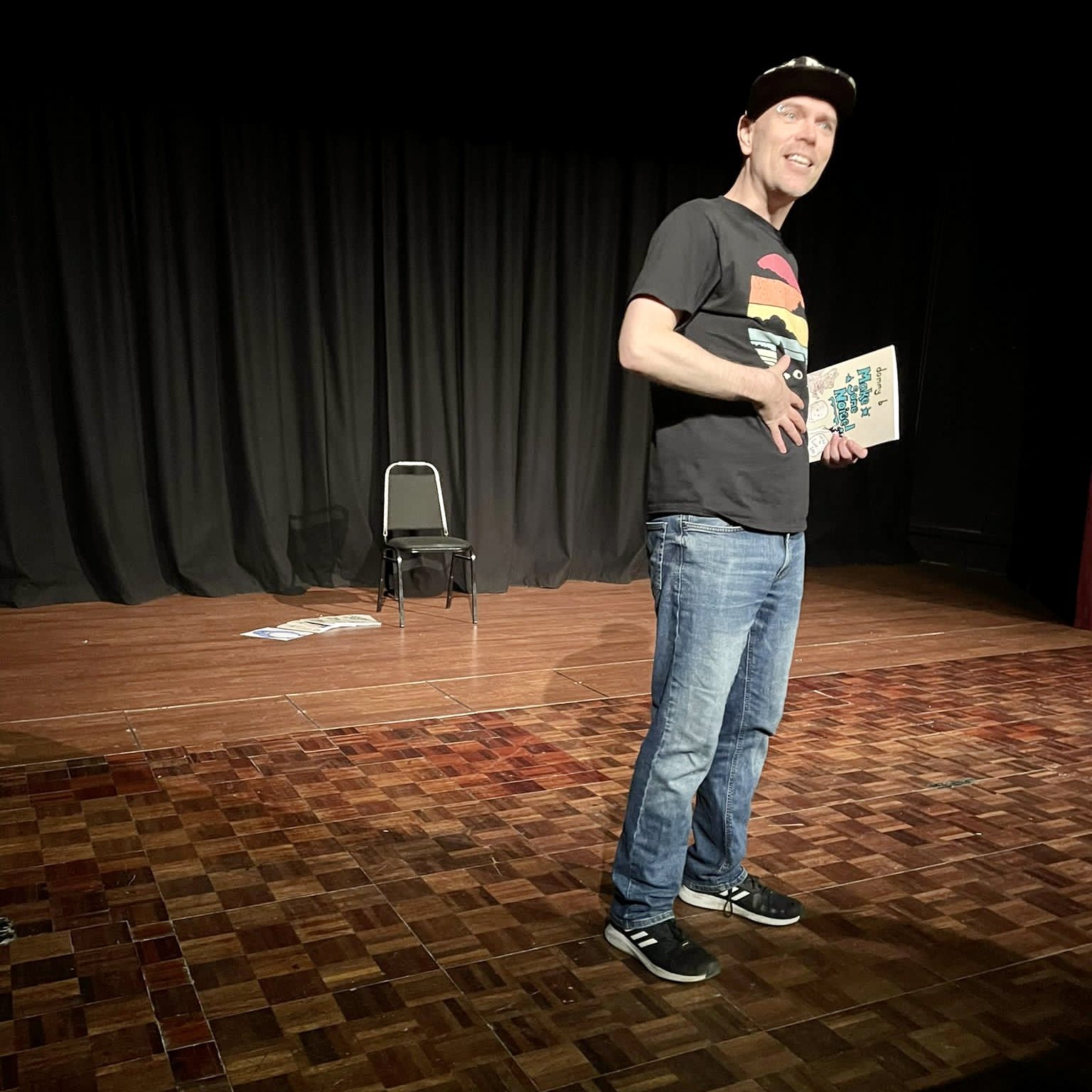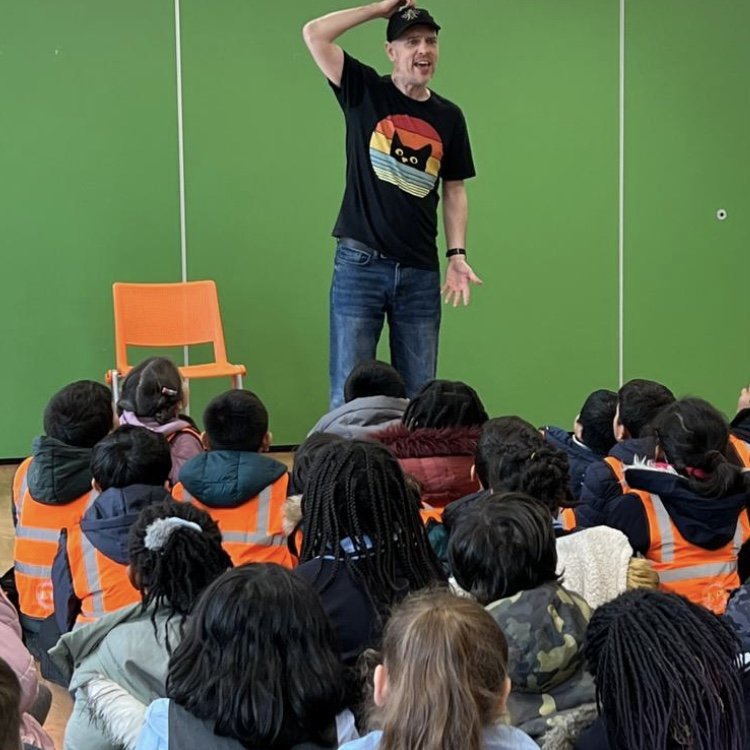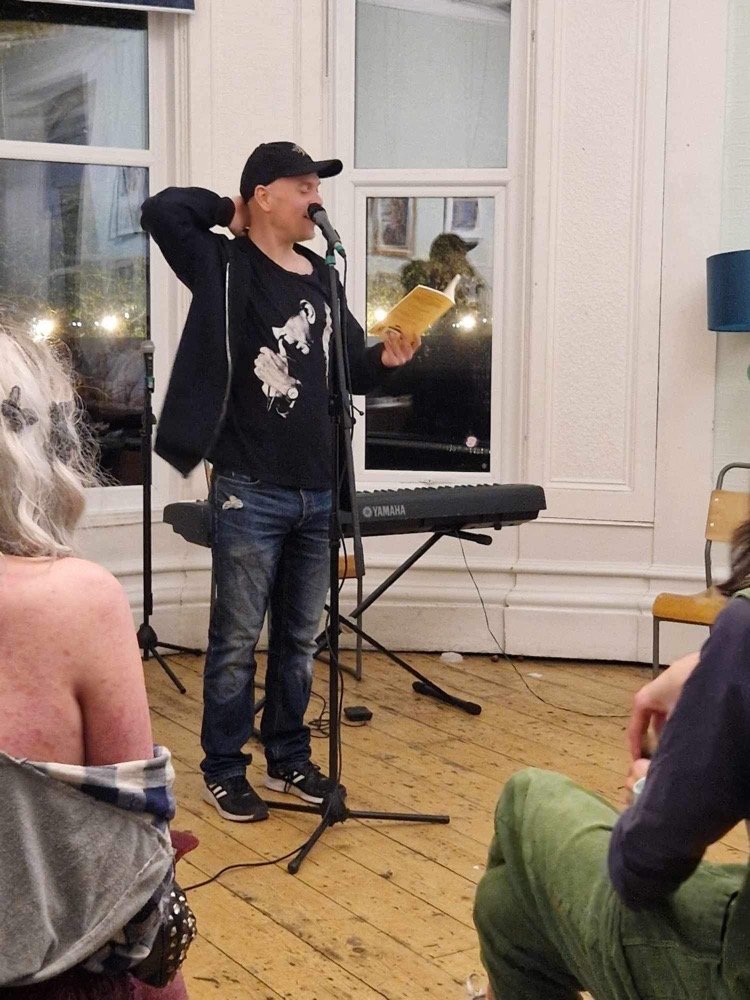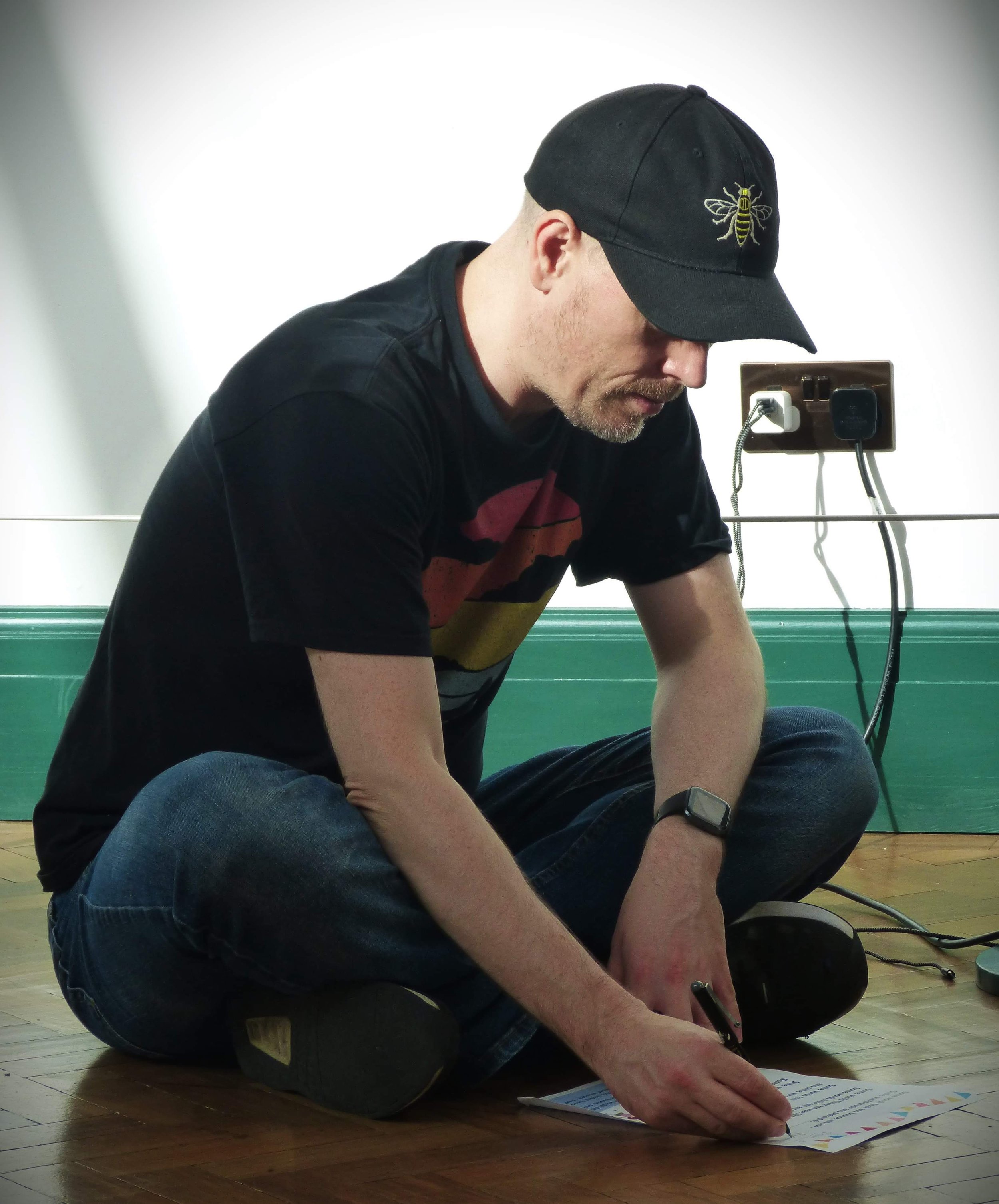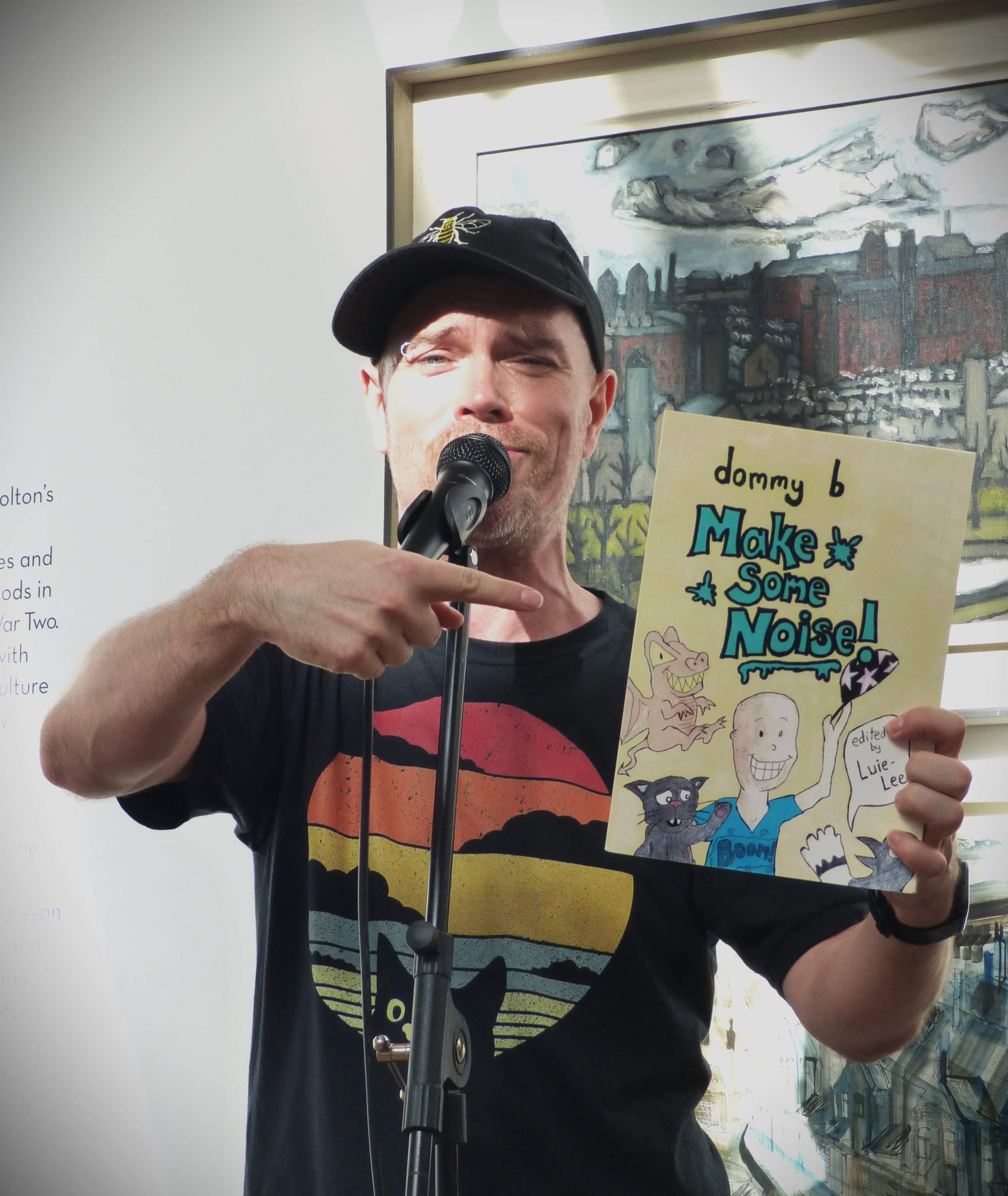December Artist of the Month – Dommy B
Our December ‘Artist of the Month’ is poet Dommy B.
About Dommy B.
Dommy B is an award-winning poet. He was 2017 Glastonbury Festival Poet in Residence, winner of the 2020 and 2017 Saboteur ‘Best Spoken Word Artist’ award, and has toured his verse across USA, Canada, India, New Zealand, Australia, South America and mainland Europe.
His other awards include winning New York’s Nuyorican Poetry Cafe Slam, UK Superheroes of Slam and, as of 2023, ten Arts Council England awards.
He has performed his poetry on BBC2 showcasing the best of 2017 Glastonbury Festival, BBC’s Greg and Celia’s Festivals Highlights and, in his favourite TV appearance, he introduced his pet ‘Dave the Dragon’ on CBeebies Rhyme Rocket.
What a visit from Dommy B entails
Dommy B works with adults and teenagers. He has a speciality in work with KS2 and KS1. He has specific skills in working with vulnerable people and people with learning difficulties.
All that is needed to get started are pens and paper!
Dommy B has over 10 years experience of big, interactive performances in school assemblies (from 20 minute poetry sets to one hour long poetry theatre shows) and then going to classes to either engage in students' individual writing exercises, or create group poems by the whole class.
Each of Dommy B’s books has an hour long performance which is easily performable in an assembly for a whole school of KS1 or KS2 students
You can read more about Dominic and his school visits here
Interview with Dommy B
How did you get started in poetry?
I loved poetry at school. I loved rhymes and alliteration and making up nonsense poems based on the sounds of words (rather than their literal meanings).
When I finished school, I carried on making up poems, even though no one was telling me to do so for educational reasons - I just enjoyed doing it. Then I saw a poet saying poems on stage in a way similar to how a stand-up comic tells jokes. I loved how movement and intonation of voice added os much to his words - it was like a political, comedic, creatively-crafted monologue. Then I found out this was what this person (James Quinn) did for a job! I knew then this is what I wanted to do with my days.
Which award or moment of your career are you most proud of so far?
In my new book, there are a large number of suggested activities at the end. I am very proud when children send me their own creations - poems, drawings and stories. I worked with Big imaginations on a number of ways adults can facilitate getting young people’s art to me appropriately and easily. I remember from when I was a child the adults who inspired me, and to see that inspiration flourish from young minds gives me immeasurable pride and joy.
Where do you get the ideas for your poems?
I think I will answer that question today differently to how I would answer on previous days, as I have a block of time set aside now to start work on the next book with Big imaginations, and I have TOO MANY ideas!
I know that some stuff which makes an adult laugh or think or feel either isn’t appropriate for or just doesn’t resonate with younger readers or younger audiences. A joke needs to make *everyone* laugh - including me. I don’t tell jokes which I do not find funny.
So the creative process usually involves a random spark of comedy - some absurd scenario - popping into my head, my half-crafting of a rough version to take to a school or library or theatre, where I can test perform it in the middle of a set of older poems, like a band testing out a new song, and seeing the reaction it gets. Hopefully it gets a reaction I like!
What is your favourite thing about visiting schools?
I love to create. I love to see others create. I feel very passionately about no child being left behind when a creative time is taking place, and to be in a room with so many different people all enjoying the pleasure of making a new piece of art happen - well, if we could bottle that feeling - it’s the best!
I enjoy that more than writing alone. Writing doesn’t have to be lonesome. I usually start first drafts solo, but the editing phase is more fun for me - being with others creatively is my preferred state and visiting schools and generating ideas from students is a powerful and excellent place to be!
How do you keep such energy and enthusiasm going during a school visit?
I try to remember to say to students ‘writers do not have to be loud and bounce and funny, its just one way of being, and I way I am because I love being this way, but there are other ways which are just as good. To be a quiet, still, subtle writer is also an amazing way to be - its all variety and its all valid and all has the potential for great art’.
I keep enthusiasm because I love what I do so greatly, and I feel very privileged that I get to be me in my work. As a lad, I was bullied for being ‘different’ and ‘weird’ - a state which now actually helps my existence as a performer - so I’m thankful my career never involves me pretending to be someone or something I am not. It is the best way to spend time!
What has been your most memorable moment from working in a school/with young people?
So many. One unusual and special one was where I was commissioned by, of all places, a building site! There was to be hoardings up around a construction area and I was able to help young writers come up with words about their community with which to cover the temporary walls. It looked wonderful.
Do you think everyone has the potential to be a writer?
Yes. There are so many genres of writing. It is about trying different things, a little perseverance, a little bit of stepping out of one’s comfort zone, in a safe, nurturing space, and finding a way in which to create with joy.
How do you spark some creativity and enthusiasm from the less involved or less able pupils?
I believe everyone loves to laugh. I believe everyone loves to be listened to without judgement. For many complicated reasons, sometimes children feel nobody listens to them. When I make a child laugh and then listen to what they have to say, that is a strong foundation for creativity.
I do not follow a syllabus. In not following a syllabus, skills are developed which definitely improve students ability to undertake syllabus projects. But without a syllabus (or any ‘target’ other than to be present and be creative), there isn’t really any such thing as ‘able’ in this context.
It is about working with the other adults to create a space free of distraction and unhelpful factors - in all honesty something I can say has always happened with my Authors Abroad work (not always elsewhere, though I’m recalling very old memories there of times long gone by) - this is the responsibility of the other adults and me - not the children. We need to make a great space for the children to be.
From that starting point, the children have nothing to prove to anyone.
There are encouraging, gentle, fun ways to edit or spark new ideas without a child feeling they have done it ‘wrong’, because they have not done it ‘wrong’. In what we do, there is no such thing as ‘wrong’, (providing we adults have made a great space for them to be).
It means so much to me, more than words can say, when after the teaching staff say about certain students, ‘I never thought this child would even take part, but look how great their art is today.’
Have you always been this confident in front of crowds or was it practice? What words of advice would you give to someone shy but who has a lot to say?
It was practice.
My advise is … practice.
Practice lots!
In our space, we have nothing to prove, but …. enter a writing competition, and you do want to be the best that you can be - you do have something to prove there. It is a different way of being and there are steps, steps which involve a lot of practice and a nurturing of resilience, to get from the first draft space to the ‘this is be put forward for a potential prize’ stage. Practice practice practice! Know when a piece is ready to put forward for feedback on how to edit, and choose carefully who to ask for feedback (maybe not your best friend or mum, maybe a professional writer whose writing you like), and be prepared to listen to what is said to you.
You’ve travelled quite a bit with your poems – do you need to adapt things for different countries? What has been your favourite place to perform?
New Zealand! Beautiful place with super friendly people who take hospitality very seriously. Yes! I have been surprised by words and sentences which have different connotations in different cultures. This is a challenge when the word is in a rhyme and is not easy to change! I test the poems on locals and sometimes add introductions before poems in which I say clearly ‘I’m going to be using thus phrase in this poem which I don’t think you use here, and it means this’
Why is it important that schools involve poetry in their curriculum?
So many reasons, I could write a theses! It is joyful. It provides the opportunity for focus on language which other forms of writing don’t always nurture, as other factors often take precedence. Poems are amongst the most concise forms of writing, and getting reluctant readers to read poems may be an easier way to get kids who think books are not for them into books.
You also run some of our A.I.M High days, how do these differ from your author visits with us?
I love these days. I love all the different days, visiting schools in different ways. One way in which these are different is it is lovely to have a larger number of schools attending, so the students do not all know each other. Although this can, for them, may be a scarier way in which to start, I think it makes it more of ‘an event’. School trips are under threat, and they must continue - their value is vast and the memories made may last a lifetime.
Do poems always have to rhyme?
No. But mine usually do! Sometimes a rhyme in itself seems to be a punchline to a joke. My recent poem ‘Imaginary friend’ contains many giggles, and in that particular poem every chuckle comes from subverting expectation of what will rhyme. Rhymes are fab!
Have you ever got the giggles whilst performing one of your own pieces and struggled to finish it?
No. But children do!
I often say to children, ‘You are hilarious. But if you laugh at your own jokes, no one will hear the punch line, and it will be either less funny or, worse, we won’t understand what you’re saying, so you need to do what I have done - because I am also hilarious - and we need to practice practice practice until we do not laugh at our own jokes. Not easy, when you are as funny as we are!’
Tell us about your work in the theatre.
I tour theatres up and down the country with solo shows of my poems - and it is fantastic. I am currently touring ‘Make Some Noise’ with a January date in London’s Half Moon theatre and loads around my home in the north-west.
What are your future goals?
Keep writing! Keep performing!
I’m not a very ambitious person really - I enjoy what I do so very much, I just like carrying on doing it. I do believe each poem I makes is better than the poems which came before as they come from a place of greater experience (although my readers and audiences may not agree. I mean, ’dragon in my homework’, a ten year old poem, is probably my ‘greatest hit’, followed closely by 2017’s ‘Zombie Bunny’ … but ‘Can We Roar?’ and ‘Listen’ from the new book are close to joining them in the ones folks most often ask me to say.
Quick Fire
Early bird or night owl?
Night!
Starter or dessert?
Starter (I know! But savoury over sweet for me)
Would you rather explore the ocean or go to space?
Deeeeeeeeeeeeeep ocean - to see all the weird and wonderful creatures in the furthest out parts of the sea! ( we might need a bit of magic to make me happen, I think in reality the pressure is too great for a person to actually go!)
If you were to have a sidekick, which animal would you pick?
Black cat!
Board games or computer games?
Both. But if I had to choose …. Well, I know the correct answer would be board games but the honest answer is I’d go with sonic the hedgehog every time!
If you were Prime Minister for the day, what law would you introduce?
Hahahaha! More poems! Some adults think poems are not for them. That’s dismissing multiple genres of art - art with the power to develop empathy, mindfulness and fun. Poems on primetime TV - not poems to advertise things - poems with passion! With funny bits. Said by me and the students with whom I create!
Arrange for Dommy B to visit your school
To make an enquiry about Dommy B, or any of the other authors, poets & illustrators listed on this website, please contact us as follows
UK visits
Email: UKbookings@caboodlebooks.co.uk
Or contact Head of UK Visits, Yvonne - 01535 279850
Overseas Visits
Email:Overseasvisits@caboodlebooks.co.uk
Or contact Overseas Manager, Robin - +44(0) 1535 279853

